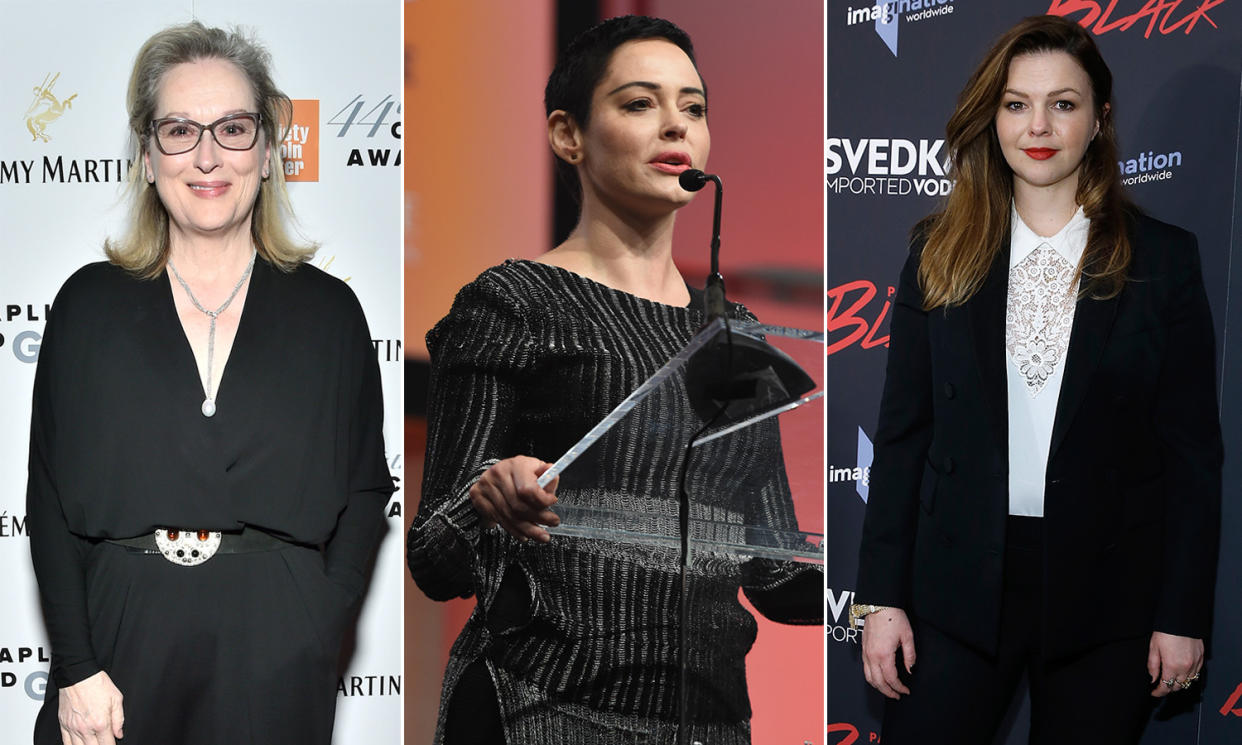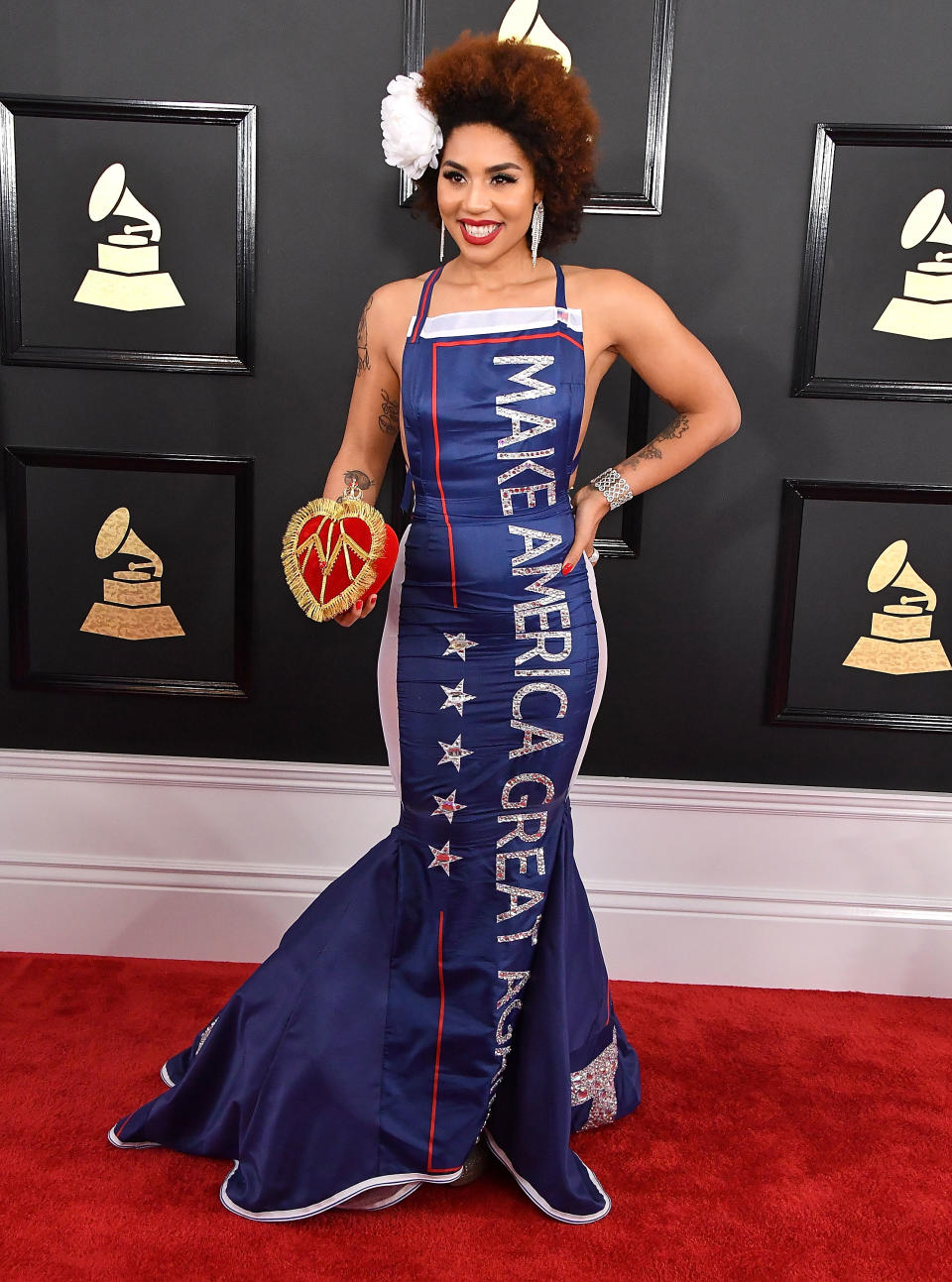Actresses may wear black to the Golden Globes to protest sexual harassment. Is that 'slacktivism'?

Amber Tamblyn is slamming Rose McGowan’s criticism of celebrities reportedly planning to participate in a silent protest by wearing black at January’s Golden Globes, raising questions over whether fighting sexism with style is effective.
On Sunday, Tamblyn, 34, tweeted the following: “THREAD: Rose McGowan is a friend and while I support her kind of movement, I do not support any woman (or man) shaming or taunting the movements of other women who are trying to create change. Telling us to all wear Marchesa? This is beneath you, Rose.”
THREAD: Rose McGowan is a friend and while I support her kind of movement, I do not support any woman (or man) shaming or taunting the movements of other women who are trying to create change. Telling us to all wear Marchesa? This is beneath you, Rose.
— Amber Tamblyn (@ambertamblyn) December 17, 2017
Tamblyn further added that McGowan’s tweets were “below the belt” but that “our movement is big. And a black dress is just the beginning of the darkness that will be drained from every industry across the country by the time we’re done. That’s a promise.”
You don’t have to support and stand with us, but we stand and support you. You may take below the belt shots at us but we will not take them at you in return.
— Amber Tamblyn (@ambertamblyn) December 17, 2017
Our movement is big. And a black dress is just the beginning of the darkness that will be drained from every industry across the country by the time we’re done. That’s a promise.
— Amber Tamblyn (@ambertamblyn) December 17, 2017
And we stand together in this fight, shoulder to shoulder, weapon to weapon, woman to woman (and man), body to burned body. And our arms are open. And our hearts two fold. And our fire will be a universal scorch. Heed the mantra: #ChangeIsComing
— Amber Tamblyn (@ambertamblyn) December 17, 2017
Tamblyn also wrote of McGowan, “Her statement was public and hurtful to some women so a public response was earned. I spoke to her at length today, she knows how I feel. I love Rose fiercely, that will never change. To be critical of an action is not to condemn the person behind it. There’s your common message.”
Tamblyn was responding to a now-deleted tweet Saturday by McGowan that called out Meryl Streep for planning to participate in the upcoming fashion action, despite her previous working relationship with Harvey Weinstein (assumed to be the “Pig Monster” in question), one of many public figures accused of rape and sexual harassment by dozens of women, McGowan included.

“Actresses, like Meryl Streep, who happily worked for The Pig Monster, are wearing black @GoldenGlobes in a silent protest,” McGowan reportedly tweeted. “YOUR SILENCE is THE problem. You’ll accept a fake award breathlessly & affect no real change. I despise your hypocrisy. Maybe you should all wear Marchesa.” The Marchesa dig was directed toward Georgina Chapman, Weinstein’s ex-wife and co-founder of the fashion brand.
If the talk of a dark dress code, originally reported by People, is true, it wouldn’t be the first time Hollywood has worn its politics: In January, The Big Bang Theory star Simon Helberg walked the red carpet at the Screen Actors Guild Awards carrying a sign that read “Refugees Welcome,” and his actress wife, Jocelyn Towne, had the words “Let them in” written across her chest, a response to President Trump’s travel ban on some Muslim-majority countries.

At this year’s Academy Awards, Karlie Kloss wore a blue pin in support of the ACLU, while Emma Stone wore one from Planned Parenthood. In February, American Honey star Sasha Lane wore a Black Lives Matter T-shirt to the Independent Spirit Awards show, and at the Grammys, singer Joy Villa wore a red-white-and-blue dress with Trump’s campaign slogan, “Make America Great Again.”
On the runway, fashion designers have been speaking out: During New York Fashion Week, models for Prabal Gurung wore T-shirts that read, “Stay Woke” and “Nevertheless She Persisted”; and some designers, like Marc Jacobs, have outright refused to dress the first lady. “I have no interest whatsoever in dressing Melania Trump,” Jacobs told WWD in November 2016. “Personally, I’d rather put my energy into helping out those who will be hurt by Trump and his supporters.”

Even in politics, fashion is a statement — when Hillary Clinton and her supporters hit the election polls in November 2016, they all wore white, one of the official colors of the National Woman’s Party, which helped secure women’s right to vote in 1920.
But other than a bevy of pretty black dresses, what will the effort actually achieve? That depends on what follows, says Valerie Steele, director and chief curator of the Museum at the Fashion Institute of Technology (FIT).
“These types of gestures can be effective, but they need to be in sync with an actual movement as opposed to a trend,” Steele tells Yahoo Lifestyle.
In other words, a sea of celebrity LBDs make for pretty photos on your feed, but if there’s no call to action — speeches with impact, partnerships with social justice organizations — or ongoing effort, the event can fall into “slacktivism” territory, a term for activism-lite that’s more symbolic than significant.
What’s more, the effort must also affect a broader audience. “It’s horrible for women in Hollywood to be preyed upon, but it’s also horrible for the anonymous women without that same voice,” says Steele, adding that the reverberations should ideally spread across social and political divides. “Awareness in liberal enclaves is usually not enough to cause changes in behavior.”
Fashion writer Natalia Powell concurs. “It’s great that women are banding together to support an issue; however, fashion can only bring awareness for a period of time,” she tells Yahoo Lifestyle. “Change needs to be effected at the core and root of the problem, which is sexism, abuse of power, and hypermasculinity.”
Wearing black dresses is one way to show solidarity, Powell adds, but accountability is key. “Men need to get involved when sexual harassment is witnessed and reported,” she says. “Names need to be named. No more protecting those in power. And oversight committees that handle these types of claims and investigations need assembling.”
Powell adds, “Long-lasting change is going to take more than a colored garment on one night.”
Read more from Yahoo Lifestyle:
People are really puzzled by Sharon Stone’s Golden Globes hairstyle
Eminem is still using the word ‘retarded’ — why that’s an issue
Follow us on Instagram, Facebook, and Twitter for nonstop inspiration delivered fresh to your feed, every day.


